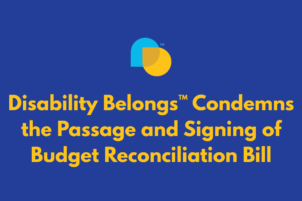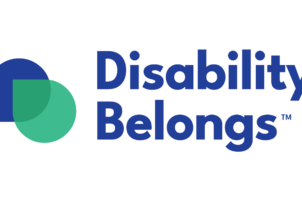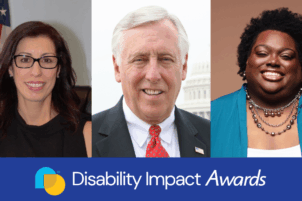Washington, D.C., April 8 – As lawmakers continue to work around the clock during this critical time, RespectAbility acknowledges the importance of ensuring people with disabilities are fully included in life-saving efforts.
“The RespectAbility team has been very hard hit,” said the organization’s President Jennifer Laszlo Mizrahi. “Our IT consultant died last week, and our immediate past chairman has COVID-19, as do two other members of our extended team. Therefore, these issues are very personal to us and are working hard to get journalists and leaders the facts and sources they need so that policy makers and the public understand both the stakes and solutions to solving this shared crisis.”
People with disabilities are exceptionally vulnerable to the potentially life-threatening impacts of the virus and face even greater challenges than the general public in this pandemic. Statistically, one-in-five people has a disability. From food insecurity and access to healthcare/testing to switching to telework and life-or-death medical decisions, people with disabilities are impacted by these events. This crisis demands leadership at every level of government.
Members of Congress, Governors and their staff may have already thought of – and be working on – all the issues below. However, in case they are not, RespectAbility has outlined several areas of concern and opportunities for solutions and hope to address COVID-19’s impact on people with disabilities:
ENABLE PEOPLE WITH DISABILITIES WHO ARE LIVING IN THE COMMUNITY TO HAVE ACCESS TO FOOD & NECESSITIES:
As the country extends shelter-in-place orders, efforts are required to ensure people with disabilities, especially those living in private homes/apartments and/or group homes have access to food and basic supplies:
- Expand food security measures by allowing SNAP funding to be used for online food and grocery delivery services.
- Extend the parameters of traditional home-based meal delivery programs such as “Meals on Wheels” to include people with disabilities, especially those not traditionally classified as homebound who are temporarily unable to circulate in the community as a precaution. This is especially important for people who are blind and/or use wheelchairs who cannot shop safely at this time.
- Food access is especially critical for people with disabilities in congregate settings – including to individuals that are now homebound due to social distancing procedures. They need access to home delivered meals, grab-and-go as well as drive-through meals.
- Work with Centers for Independent Living (CILs) as they are led by people with disabilities and directly support individuals living in the community. CILs have the flexibility to provide nutrition services and supports to people with disabilities but need continued support.
- Allow individuals and/or residential settings housing people with disabilities to qualify for the same priority delivery that Amazon is providing for hospitals and institutional care facilities.
- Work with private providers to prioritize delivery windows of commercial services such as Amazon Fresh and InstaCart. Consider subsidy of delivery fees on these services for people temporarily homebound receiving SSI or SNAP.
- Expand senior and disability hours at local grocery stores to include home health aides and personal care attendants who can provide proper identification.
- Enforce, rigorously, the rules to ensure the safety of caregivers and people with disabilities.
PROTECT DISABLED LIVES:
We must redouble efforts to ensure the lives of people with disabilities are valued equally to those without. Here are a few practical policy points. We must:
- Resist any attempt to institute healthcare orders of priority that assign lower value to the lives of people with disabilities. Medical providers will need to make hard decisions in the days to come, but affirm U.S. law in our policy by making sure we don’t ask doctors to make the additional impossible choice of valuing one life more than another simply because an individual lives with a disability. The Office of Civil Rights at HHS recently put out clear guidance to protect the civil rights of people with disabilities and ensuring equity of care. It was a great statement already but it is a life-saving message that needs to be repeated throughout the media and with healthcare providers.
- Guarantee access to testing to people with disabilities, especially when traditional paratransit deems it unsafe to transport them. We also need to ensure access to medical care and that we have strategies in place to continue to provide the community-based supports necessary to sustain the lives of people with disabilities who become infected but are not sick enough to require a hospital bed. Sending an infected person to a congregate care facility, without sufficient medical precautions and Personal Protective Equipment (PPE), could endanger the lives of every other individual and/or caregiver in that facility.
PROTECT FRONTLINE RESPONDERS AND CAREGIVERS:
Home health aides and personal care attendants are the unsung heroes of independent living. Many people with disabilities, even those who are otherwise unaffected by COVID-19, require that their Direct Support Professionals (DSPs) or Personal Care Attendants (PCAs) remain safe and healthy in order to remain alive.
- Ensure front line responders and caregivers, including home health and care professionals, get the PPE, testing and resources they need to serve those most at risk of experiencing COVID-19.
- Community service workers need to be considered tier one for receiving PPE, because in many cases, they are directly support workers with disabilities in essential roles.
- States need to ensure they are supporting DSPs and PCAs as well as providers in the community by providing personal protective equipment wherever possible.
ENSURE PEOPLE WITH DISABILITIES CAN KEEP THEIR JOBS AND/OR GAIN EMPLOYMENT WHEN THE CRISIS IS OVER:
Guarantee that the unemployment resources/stimulus efforts explicitly provide additional and accessible resources for people with disabilities who may lose their job as a result of lockdowns, social distancing or other pandemic-caused economic disruptions.
- Recognize that, indeed, as we pull out of the health crisis, it will be vital to move to “Employment First” policies that blend and braid resources to help people with disabilities gain or regain as much independence as possible.
ENABLE THE WORKFORCE SYSTEM TO HELP PEOPLE HAVE THE JOBS THEY NEED TO SURVIVE:
The nation’s workforce system has a pivotal role in the months to come as we all work to retrain laid-off workers, connect displaced workers to new opportunities and meet the unique needs of jobseekers with disabilities. The nation’s workforce system, defined in the titles (I, II, III, and IV) of the Workforce Innovation and Opportunity Act (WIOA), stands ready to meet the needs of workers with and without disabilities caught up in this crisis. However, the system could easily be overwhelmed given the massive scope of job losses due to COVID-19. According to the Campaign to Invest in America’s Workforce (CIAW), the workforce system experienced a 234 percent increase in clients during the Great Recession. The current situation is projected to be far worse. As such, leaders at the federal, state and local levels need to come together in order provide the system with policies and resources that will help Americans get back to work.
VERIFY AVAILABILITY AND ACCESSIBILITY OF INFORMATION:
Ensure resources and information about the spread of this virus are accessible to people who are deaf, blind and/or have cognitive disabilities. This includes having American Sign Language (ASL) interpreters present and clearly visible on camera at all public briefings, as well as closed captioning.
OFFER ONLINE MENTAL HEALTH SUPPORTS:
Pay special attention to the effect of social distancing and this crisis on people with disabilities with underlying or new mental health conditions.
SUPPORT NONPROFITS THAT SERVE PEOPLE WITH DISABILITIES:
There are more than 22,000 providers in our nation’s wider aging and disability network. These providers include small community nonprofits as well as larger nonprofits with affiliates in different states. As fundraising events for nonprofits have been canceled, needs have skyrocketed. Thankfully, the new SBA/PPP loans are available to nonprofits. However, many nonprofits do not know how to navigate the forms or have good bank contacts. Technical support around this is vital, as public commitments from lenders only want to work with nonprofits with whom they have a previous relationship. Helping nonprofits navigate this maze can save providers who are needed today and will continue to be needed tomorrow.
For more resources and updates from RespectAbility about the COVID-19 pandemic and its effects on the one-in-five people who live with a disability, visit www.respectability.org/covid-19.









And to help people that are on ssi to get some kind of compensation if they been claimed by a loved one cause I have Bill’s and only get 783 but my son claimed me cause I live with him but I pay Bill’s here and now I get no 1200 cause of this and I can not get things I need
Did they ever resolve the ability for those in Ssdi who work part time to get the PUA $600 unemployment and not get penalized
So we dont matter because we disabled? Can’t even get into portal let alone we heard all these different stores we getting money and now we not. Isn’t this discrimination. I have epilepsy and PTSD can’t get to food banks so since we’re poor we just get left in the dark. What are we suppose to do this has cause emotional distress. I just don’t understand how its okay to lie to us and espect us to figure it out on our own? How are we suppose to do tht. Alot of us are not even able body people. Misleading information to the elderly and disabled? We need answer this isn’t fair to us at all. Isn’t tht violating our rights? I just want to know do we matter?
I would also like to know. I was just awarded a Fully Favorable decision and the social security starts the award under SSI qualifications first. My husband already recieves SSI and SSD. I have worked part time self employed for years. I should be eligible for PUA but worried it will hurt both of us.
I can barely work at all with I got and now put back in the hospital all time and I have conversations and other lost blood brain and deal dissactive endifine disorder fibromyalgia and myositis high blood pressure disorder chronicle disorders I can’t barely rent or electric
I agree.i just found out that its law that i apply 4 pua after i paid someone to help me apply 4 pua.and the 1st 20 isnt count ed but every dollar after that dollar 4 dollar by ssi.i dont understand why u just now learned of that law.i know way more about covid 19 than thhttps://www.facebook.com/100008623868960/posts/2413618765602229/is govts half ass walk